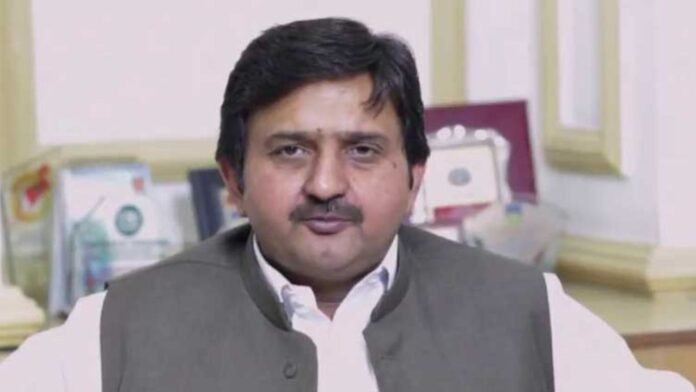Malik Ahmed Khan, the Speaker of the Punjab Assembly, organized a press conference where he made a poignant remark: “There is always a line that should be drawn, especially regarding the right to protest and its ramifications, if any, in the general public.”
In his statements, he illustrated realistically that notwithstanding the constitutional provision of the right to demonstrate, this right does not include trampling on the rights of others. His comments raise critical questions: To what extent is the right to protest protected? What are the legal and constitutional boundaries? Can protests be peaceful without infringing upon public order?
The Speaker raised concerns about the form protests take, especially when they escalate into actions that disturb entire cities or regions. He pointed out the necessity of maintaining law and order, stressing that this is the provincial government’s responsibility. “The government must provide clear facts about the state of law and order,” he said, underscoring the need for transparency and adherence to provincial responsibilities when protests threaten to spiral out of control.
The Role of Law and Order in Maning Protests Malik Ahmed Khan
Malik Ahmad Khan argued that maintaining law and order is paramount in managing protests. Criticized the approach taken by protesters who sometimes mobilize police resources away from their duties in the province to participate in marches on Islamabad. He claimed that such actions are disruptive and burden law enforcement agencies that should safeguard the public.
He emphasized that protests should not take over entire cities, creating unnecessary chaos and inconvenience for the public. Law enforcement agencies are responsible for ensuring that protests remain peaceful and within the confines of the law without endangering public safety or infringing upon citizens’ rights.
A Reflection on Past Protests: May 9 and its Repercussions Malik Ahmed Khan
In his comments, the Speaker reflected on the violent protests that occurred on May 9, which led to massive property damage, including the burning of the Radio Pakistan building in Peshawar and the defacement of anti-British and Indian martial monuments. Malik Ahmad Khan asked the Leader of the Opposition a pertinent question: “Are you planning your protest to resemble the events of May 9?” His words clearly emphasized the difference between peaceful demonstration and unlawful rioting, urging political leaders to ensure that no demonstration takes place outside of lawful and peaceful boundaries to prevent chaos.
Another reminder of how pre-monumental protests can change into revolts with shocking damage within the shortest time possible, and then restoration of sanity in society becomes a daunting task, May 9 and May 9 protests. Malik Ahmad Khan accepts the events of May 9, even though everyone understands that some legal restrictions exist on what is considered acceptable. Violent and violent acts of that nature should not be justified because there can never be a revolution without violence.
Protests and International Relations: Reflecting on the 2014 Visit of the Chinese President Malik Ahmed Khan
The Speaker of the Punjab Assembly also brought to mind an incident of 2014 when the president of the People’s Republic of China was to visit Pakistan. At that particular time, one of the political parties had gone on a protest sit-in and erected tents on busy roads, creating havoc during such a visit. Malik Ahmad Khan, however, stated that people who do such things break the law and have a bad image of Pakistan.
He was very vocal in stating that while political opposition is an essential feature of democracy, it must not come at the expense of law and order or diplomatic relations. He was evident in his contention that no one had the authority to barricade roads or cause necessary disruption to the public in the name of agitations. Therefore, the government must act decisively to prevent such breaches.
Duties of the State – Enforcing the Law and Maintaining Order Malik Ahmed Khan
In the discussion, Malik Ahmad Khan made it clear that it is also the government’s responsibility to safeguardizens’ rights, including the right to live in no constant disturbance, sanded out that while legislative provisions protect a right to peaceful assembly, it is not a license to infringe upon the law or the rights of others. However, we cannot condone lowering democracy to merely exercising the right of movement and mass assemblies when such activities lead to beating civilians, obstructing road access, and firing indiscriminately, among other violent actions.
However, the Speaker warned the government that there is a time to sit back, but that time is not always. Suppose protests turn into criminal acts of violence and destruction. In that case, the government has to be obligated to prevent the acts of small individuals from taking away the rights of those.
In conclusion, a balance is essential between the rights and responsibilities of the people.
his address, Malik Ahmad Khan observed that respecting the right to protest and keep order is necessary. Protests are one of the most essential factors of expression in a democracy, but these should be within reasonable limits and should not lead to violation of peace anywhere. What the Speaker of the Punjab Assembly suggested is also essential; the government should guarantee that protesting does not unreasonably occupy other people’s rights or overtake their way of life. That is why preserving this balance remains a primary source of such priorities- democratic liberties and public order.


